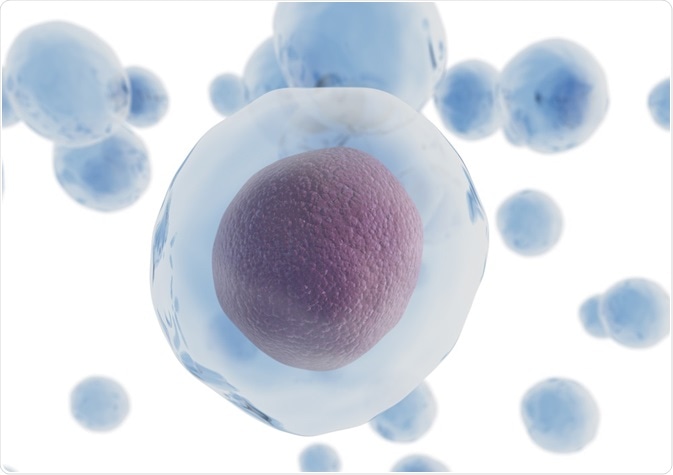
Tumor Suppressor Genes
Tumor suppressor genes have an important role in the prevention of cancer. Functioning tumor suppressor genes encode proteins which inhibit tumor growth through different mechanisms.
 Credit: Jezper/Shutterstock.com
Credit: Jezper/Shutterstock.comDamage to tumor suppressor genes is associated with carcinogenesis and inheritance of mutated tumor suppressor genes significantly increases the risk of some cancers. Tumor suppressor genes therefore represent a therapeutic target, with advances in gene therapy providing the potential for reintroduction of functioning tumor suppression pathways.
Proteins encoded by tumor suppressor genes
Tumor suppressor genes encode proteins that inhibit cell proliferation and prevent cancer cell growth. The different mechanisms by which tumor suppressor genes regulate cell survival include the control of cell division, promoting apoptosis and halting metastasis.
The main mechanism of tumor suppression is through the control of cell division. The first discovered tumor suppressor gene, Rb encodes for the retinoblastoma protein and inhibits cell cycle progression until the cell is ready to divide.
Rb regulates cell division by preventing the transcription of genes required for mitosis by binding to transcription factors. Other tumor suppression genes interfere with cell adhesion within the growing extracellular matrix resulting in inhibited cell division because of the restricted contact.
Tumor suppressor genes also encode for proteins that promote apoptosis or programmed cell death. The p53 gene is an example of a tumor suppressor gene which encodes for a protein that induces apoptosis through two cellular responses. The first pathway activates a caspase cascade whilst the second intrinsic pathway promotes apoptosome formation.
Metastasis involves the spread of cancer through the development of secondary malignant growths. This occurs when tumor cells interact with endothelial cells leading to the formation of new blood vessels and the breakdown of vascular walls. Some tumor suppressor genes function as metastasis inhibitors including the breast cancer metastasis 1 (BRMS1) gene.
Knudson's two-hit hypothesis of tumor suppressor genes
The understanding of cancer genetics was developed from the two-hit hypothesis published in 1971. The hypothesis provides a foundation for understanding the dominant hereditary nature of cancer and the role of tumor suppressor genes.
Tumor suppressor genes generally follow the ‘two-hit’ principle where both alleles that encode for a tumor suppressor protein must be damaged before the suppression effect is inhibited. People with hereditary cancer already exhibit a mutation in one allele meaning only one mutation in the other allele is required for the prevention of protein formation. People without the hereditary mutation of one allele therefore require ‘two-hits’.
Alfred G. Knudson formulated the hypothesis and later tested it via statistical analysis of retinoblastoma caused by mutations in the Rb gene. The study noted that hereditary forms of the disease occur at an earlier age and develop in both eyes, indicating a genetic predisposition to the disease that is connected to the two-hit hypothesis.
It is now understood that carcinogenesis is dependent on both the activation of genes that stimulate cell proliferation and the deactivation of both tumor suppressor gene copies.
Tumor suppressor genes and cancer therapeutics
The increased understanding of tumor suppressor genes is providing a new area of cancer therapeutics. Targeting the loss of tumor suppressors may be an effective strategy against cancer but it is not without its challenges.
The two main methods for targeting tumor suppressor genes for therapy include the reintroduction of a functioning tumor suppressor gene copy and the development of molecule inhibitors that can reactivate tumor suppressor proteins. These strategies will require more efficient gene therapy delivery mechanisms to all target cells within the tumor.
Further strategies will need to be developed for treating cancers where multiple genes contribute to the formation of the disease. Studies have proven the viability of such an approach, however, with the reactivation of tumor suppression able to induce apoptosis in cancer cells.
Reviewed by Afsaneh Khetrapal Bsc (Hons)
Sources:
- Hino, O. & Kobayashi, T. 2017. Mourning Dr. Alfred G. Knudson: the two‐hit hypothesis, tumor suppressor genes, and the tuberous sclerosis complex, Cancer Science, 108, pp. 5-11.
- Cooper, G.M. 2000. The Cell: A Molecular Approach. 2nd edition. Sunderland (MA): Sinauer Associates: Tumor Suppressor Genes.
- Sun, W. & Yang, J. 2010. Functional Mechanisms for Human Tumor Suppressors,Journal of Cancer, 1, pp. 136-140.
- Guo, X.E. et al. 2014. Targeting tumor suppressor networks for cancer therapeutics,Current Drug Targets, 15, pp. 2-16.
Further Reading
Last Updated: Mar 16, 2018





















.jpg)












No hay comentarios:
Publicar un comentario